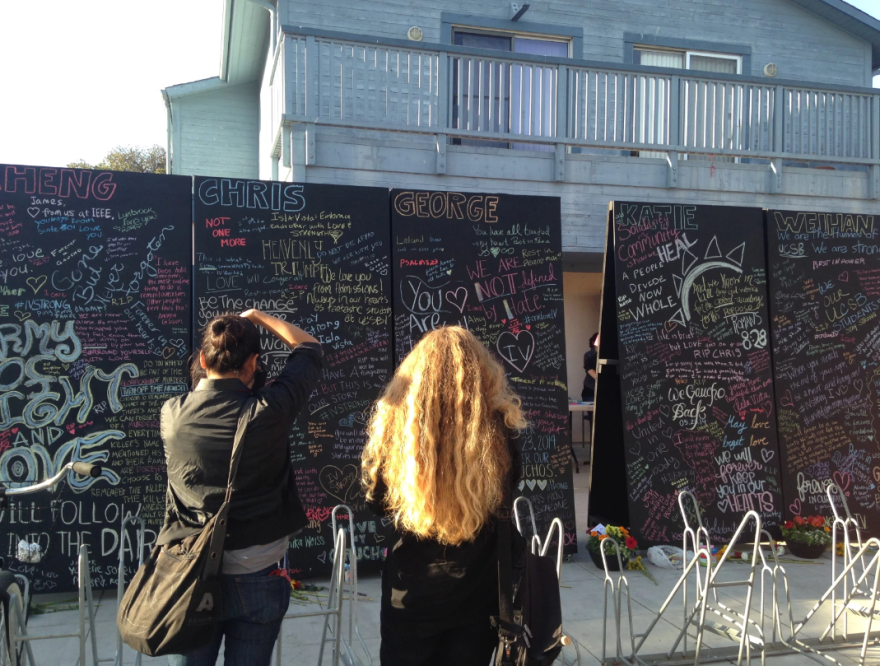May 23rd is the 10th anniversary of the mass shooting in Isla Vista where gunman Elliot Rodger killed six people, injured 14 others and later killed himself. In a recent Mother Jones article titled, “Lessons From a Mass Shooter’s Mother,” reporter Mark Follman interviewed Chin Rodger, whose son perpetrated the 2014 attacks.
KCBX’s Alyssa Toledo spoke with Follman to hear more about his reporting.
Alyssa Toledo, KCBX reporter: I'd love to ask you what your initial impression of Chin Roger was. How did you find her and what did that initial conversation look like?
Mark Follman, Mother Jones reporter: Well, Chin Roger is quite a unique figure in the terrain of this subject matter of mass shootings. I've been investigating this subject for more than a decade, and I've interviewed many, many people around this problem from all sides of it — survivors, victims, parents, FBI agents, police, psychologists, educators, on and on.
I had never heard of someone like Chin Roger before. I had never before heard of a parent of a perpetrator, of a mass shooter, who was willing to engage in the horrific story of her own son's crime and suicide — in order to try to help with the mission of prevention, to go deep into the case and share what she knows and knew about her son. Even with the deep investigation that happened after this event, there were many things, of course, that a parent might know that wouldn't have been known to investigators.
She was very reluctant to talk to me, to any journalist. She told me many times in the course of my interviews with her that she's always been very worried about bringing any kind of additional harm to the victim's families and she long felt that speaking publicly could could do that. So she was silent for for many years, but eventually she came to believe that engaging with violence prevention in the way that she has could potentially help prevent other tragedies and save other lives. She wanted to do that and so that's why she came forward and began speaking with me.
Toledo: You know, you've covered hundreds of mass shootings in your 12 years of reporting. How did your prep for this differ from how you prepared for other individuals who have been involved or affected by mass shootings over the years?
Follman: One of the things that really drew me to her story was thinking about how the parent of a perpetrator is someone who we almost never hear from, and I think that the public really doesn't think about much. I thought a lot about how to begin to talk with her and learn about her experience through the lens of trauma reporting, but then also with that in mind, too, this was kind of going into territory that we know very little about and could be potentially very interesting and valuable to better understand what this problem is all about.
That's always been my purpose in focusing on this subject as I have for so long. This all had to be handled very, very sensitively and carefully and it took a while to really think through the best way to tell the story. I think, to sort of take into account all of the delicacies of it. The mother, and then also the victims.
I mean, you know, this was top of mind for me throughout my reporting too, and it always is with this subject. The people who suffer directly from these attacks, who lose loved ones, the parents of the victims, the family members, and then the broader community. Because let's be honest, this subject comes up a lot. It's recurring. It starts to become numbers and statistics. How many died this time?
Approaching the problem of mass shootings through this, subject of prevention became very compelling to me. And so with Chin Rogers engagement, I knew that there would be a really potentially deep and valuable story there.
Toledo: Considering the many people that you've interviewed and the tragedies that you've covered over the years, what is one key insight that you wish the general public could understand about mass shootings and the psychology behind them?
Follman: I think a really crucial theme for me is to really rethink who the people are that do this. This is a really big kind of daunting question, I think, on the public's mind in the aftermath of these very traumatizing events because they aren't easily explained in terms of motive, in terms of the question 'why,' is to. treat perpetrators of mass shootings as evil monsters to regard them as as inexplicable evil, to other them in that way.
And, I think that's really unhelpful because these are people who do this. This is a human behavior or set of human behaviors and a set of circumstances, and if we look at it that way, we can understand it better. We can understand the nature of the problem better. And that's the first step to doing better at solving it, to reducing these kinds of attacks.
Toledo: Oh, Mark, thank you so much for your time and for sharing all that. It's been an honor to chat with you.
People can read Follman’s article, “Lessons From a Mass Shooter’s Mother” here, and listen to an hour long episode about it from the Center for Investigative reporting at revealnew.org.





